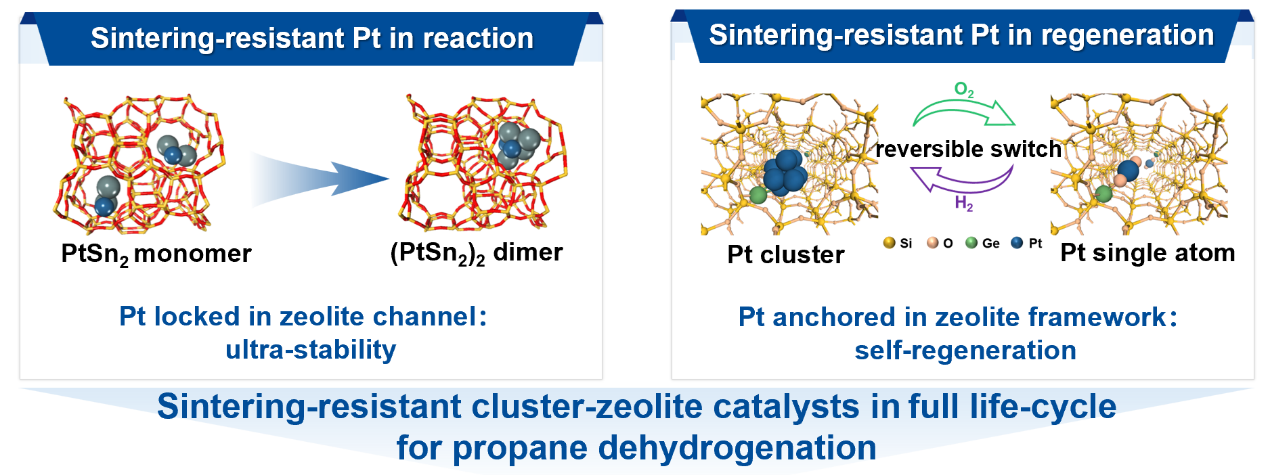Chinese Scientists Make Breakthroughs in Developing Durable Catalysts for Propane Dehydrogenation

Figure: Schematic diagram of metal cluster-zeolite catalysts for propane dehydrogenation.
Supported by the National Natural Science Foundation of China (22478076, 22221005, 22408208, 22178062, 21878050, U23A20113, and U22B6011), a research team led by Prof. Xiaojun Bao and Prof. Haibo Zhu from the Fuzhou University and Qingyuan Innovation Laboratory, has made significant progress in developing durable catalysts for propane dehydrogenation. The progress was in collaboration with SINOPEC Shanghai Research Institute of Petrochemical Technology Co., Ltd. and the Dalian Institute of Chemical Physics, Chinese Academy of Sciences. Their findings were published in two prominent studies: (1) “A self-regenerating Pt/Ge-MFI zeolite for propane dehydrogenation with high endurance” published online in Science on April 10, 2025 (https://www.science.org/doi/10.1126/science.adu6907); (2) “Pt migration-lockup in zeolite for stable propane dehydrogenation catalyst” published online in Nature on May 28, 2025 (https://www.nature.com/articles/s41586-025-09168-8).
Propane dehydrogenation has emerged as a pivotal route for propylene production. The research team aimed to develop highly stable Pt catalysts suitable for fixed-bed process. Basically, there are two main scientific issues to address: physical sintering of Pt clusters under reductive atmosphere during catalytic dehydrogenation, and chemical sintering via Ostwald ripening under oxidative atmosphere during catalyst regeneration cycles.
Accordingly, the team has achieved life-cycle-stable metal-zeolite catalysts for propane dehydrogenation by establishing two key strategies. (1) By proposing the confinement effect, metal clusters were agglomerated and locked in the channels of zeolite. This produces mesostructured-zeolite encapsulated Pt clusters catalysts that exceed the stability limitations of traditional Pt catalysts. (2) It was found that various Pt precursors spontaneously dispersed in Ge-MFI zeolite reverses the Ostwald ripening phenomenon, thereby forming highly active Pt clusters. This enables the fabrication of environmentally adaptable Pt/Ge-MFI catalysts, where Pt clusters completely self-regenerate and are anti-sintering under oxidative atmosphere in the regeneration process.
Contact Us

National Natural Science Foundation of China
Add: 83 Shuangqing Rd., Haidian District, Beijing, China
Postcode: 100085
Tel: 86-10-62327001
Fax: 86-10-62327004
E-mail: bic@nsfc.gov.cn
